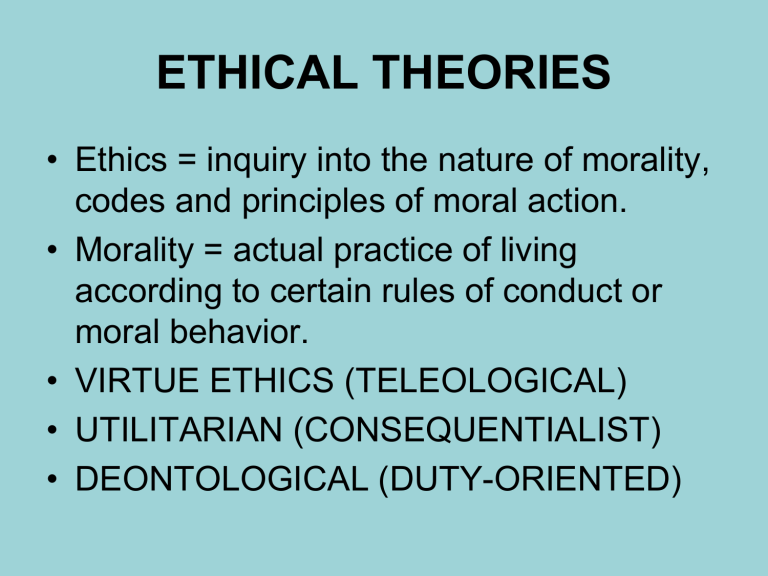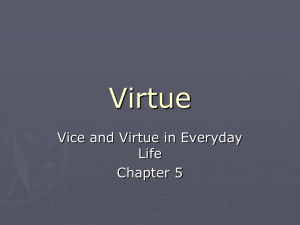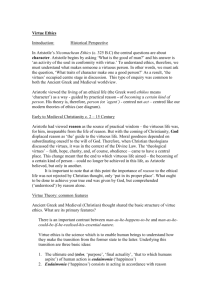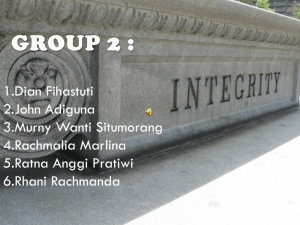What is Virtue Ethics

ETHICAL THEORIES
• Ethics = inquiry into the nature of morality, codes and principles of moral action.
• Morality = actual practice of living according to certain rules of conduct or moral behavior.
• VIRTUE ETHICS (TELEOLOGICAL)
• UTILITARIAN (CONSEQUENTIALIST)
• DEONTOLOGICAL (DUTY-ORIENTED)
ARISTOTLE (384 - 322 B.C.E.)
Aristotle
NICOMACHEAN ETHICS
• Ethics : a branch of Politics
• Moral virtues vs. intellectual virtues
• The morally virtuous life consists in living in moderation : the “Golden Mean”
• arête = excellence, virtue
• phronesis = practical, moral wisdom
• eudaimonia = human flourishing, happiness, well-being, supreme telos
NICOMACHEAN ETHICS
BOOK I – CHAPTER 1
• TELOS = END, PURPOSE, GOAL,
FINALITY
• Every art and every inquiry, and similarly every action and pursuit, is thought to aim at some good.
• Now, as there are many actions, arts, and sciences, their ends also are many.
CHAP. 2: ETHICS - POLITICS
If, then, there is some end of the things we do, which we desire for its own sake
(everything else being desired for the sake of this), and if we do not choose everything for the sake of something else
(for at that rate the process would go on to infinity, so that our desire would be empty and vain), clearly this must be the good and the chief good.
Ethics - Politics
• The Good is that at which all things aim
• The end of the science of medicine is health, that of the art of shipbuilding a vessel, that of strategy victory, that of domestic economy wealth
• The ultimate End must be the Good not subordinate to any other end, indeed the
Highest Good / the Supreme Good
Ethics - Politics
• Flute-playing as an instance of an art the practice of which is an end in itself, in contrast with the art of building, the end of which is the house built
• We observe that even the most highly esteemed of the faculties, such as strategy, domestic economy, oratory, are subordinate to the political science.
Political Science
• Inasmuch then as the rest of the sciences are employed by this one, and as it moreover lays down laws as to what people shall do and what things they shall refrain from doing, the end of this science must include the ends of all the others.
Therefore, the Good of human beings must be the end of the science of Politics.
• Moral Nobility (Beautiful/Good) and Justice
CHAP. 4: EUDAIMONIA
HUMAN FLOURISHING; WELL-BEING;
HAPPINESS; THE HIGHEST GOOD FOR
HUMAN LIFE
• All knowledge and every pursuit aims at some good, what it is that we say political science aims at and what is the highest of all goods achievable by action.
• End of politics: honor > virtue > excellence
Raffaello’s The School of Athens
Aristotle’s Critique of Plato
• The Idea of a Universal Good (Plato)
• Theory of Forms / Ideas ( eidos ), Being of beings / e.g. redness : red things :: justice
: just things (just society, just laws, fair trade, fair actions, just prices)
• Plato's (cardinal) virtues: justice, courage, temperance, practical wisdom / psychê
• 4 causes: material, formal, efficient, final
Ethics Human Nature
• Chicken-egg question: which one came first ?
• zoon logon /animal rationale ↔ zoon politikon
• Rationality ↔ Sociability
• Universal Goodness / empirical, particular instances of good (people, constitutions, etc)
• In order to achieve eudaimonia, proper social, political institutions are necessary.
• Moral virtues – Ethos – Perfectionism
• Book I, Ch. 5: theoria / praxis / poiesis :: contemplation / politics / pleasure
CHAP. 7 – FUNCTION OF
HUMAN NATURE
• If we declare that the function of man is a certain form of life, and define that form of life as the exercise of the soul's faculties and activities in association with rational principle, and say that the function of a good man is to perform these activities well and rightly, and if a function is well performed when it is performed in accordance with its own proper excellence--from these premises it follows, that the Good of man is the active exercise of his soul’s faculties in conformity with excellence or virtue, or if there be several human excellences or virtues, in conformity with the best and most perfect among them.
Book I, Ch. 8: 3 kinds of goods
• external, of the soul, of the body
• The end ( telos ) turns out to be a good of the soul
• Happiness is living well ( eu zen ) and acting well, it is the best, noblest, and pleasantest thing
• Ch. 9: Happiness comes from learning and training, is said to be divine (blessed).
Book I, Ch. 10
• The most enduring thing in life is happiness, its realization of excellent activities. Energeia / Dynamis
• Happy are those who are and will continue to be in the future good and wise and active in accordance with these qualities, not for just a period of time, but over a complete life.
Book I, Ch. 11-12
• The fortunes of one's descendants and friends after one is dead can affect one to an extent, but never enough and in the right way to destroy one's happiness.
• Ch. 12: Virtue is praised, while happiness is prized/honored, for that which is praised is for the sake of what is prized, and virtue
(good potentiality) is for the sake of virtuous activity (good actuality).
Book I, Ch. 13
• Happiness is a kind of activity of the soul in accordance with complete virtue.
• We must thus consider the irrational and rational elements of the soul ( psychê).
• The tripartite conception of the soul: nutritive (vegetative, that which causes nutrition and growth, irrational); appetitive
(attentive to reasoning); intellectual
(rational in itself).
BOOK II - CHAP. 1 : VIRTUE
• Virtue, then, being of two kinds, intellectual and moral, intellectual virtue in the main owes both its birth and its growth to teaching (for which reason it requires experience and time), while moral virtue comes about as a result of habit, whence also its name ( ethike ) is one that is formed by a slight variation from the word ethos
(habit).
Virtuous Life = The Good Life
• Although the intellectual virtues can be taught directly, the moral ones must be lived to be learned. By living well, we acquire the right habits. These habits are in fact the virtues. The virtues are to be sought as the best guarantee to the happy life. Happiness requires that one be lucky enough to live in a flourishing state.
CHAP. 6 : VIRTUE as MEAN
Virtue, then, is a state of character concerned with choice, lying in a mean, i.e. the mean relative to us, this being determined by a rational principle, and by that principle by which the man of practical wisdom would determine it. Now it is a mean between two vices, that which depends on excess and that which depends on defect; and again it is a mean because the vices respectively fall short of or exceed what is right in both passions and actions, while virtue both finds and chooses that which is intermediate. Hence in respect of its substance and the definition which states its essence virtue is a mean...
CHAP. 9 : it’s tough to be good
• That moral virtue is a mean, then, and in what sense it is so, and that it is a mean between two vices, the one involving excess, the other deficiency, and that it is such because its character is to aim at what is intermediate in passions and in actions, has been sufficiently stated.
Hence also it is no easy task to be good.
Quick Quiz !
• According to Aristotle…
1. We always desire happiness a. as a means to something else.
b. for its own sake.
c. for the sake of honor.
d. for the sake of pleasure.
2. The function of man is
a. to be alive.
b. activity of the senses.
c. activity of the soul in accordance with
God’s law.
d. activity of the soul in accordance with reason.
3. Moral virtues can best be acquired through a. study.
b. practice and habit.
c. physical exertion.
d. great teachers.
4. Virtues are
a. moral states.
b. emotions.
c. faculties. d. physical conditions.
True / False
5. Aristotle thinks that the highest good is an instrumental good (good for the sake of something else).
6. Aristotle says that virtue is a mean lying between two vices.
7. Aristotle believes that simply studying philosophy will make one virtuous.
8. Aristotle thinks that it is easy to be good because it is easy to find the mean in anything.
1. b
2. d
3. b
4. a
Answers:
5. False
6. True
7. False
8. False








